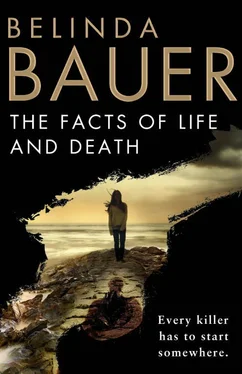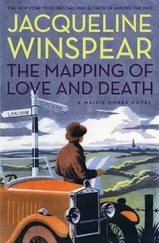Donald was on his way home from work that Saturday when he saw the newspaper in the lay-by into Abbotsham.
Newspapers were Donald’s bête noire. An entire village could be ruined by a copy of the Sun and a stiff breeze. Lurid headlines flapping in gutters, flattened against hedges, fluttering up trees. Paper tits dissolving to porridge in the rain.
So, even though the light was almost gone from the sky, and even though it had rained all day and his overalls were damp against his thighs, Donald Moon did a U-turn and pulled over.
This newspaper was the Daily Mail , which was even thicker than the Sun and, therefore, potentially even worse. Already the Coffee Break insert had escaped and spread itself across a field gate twenty yards away.
Donald picked up the main section, then went after the rest. When he got to the gate, he could see in the dim light that Coffee Break had already come apart, and that several pale pages were now dotted about the wet grass of the field beyond.
There was nothing for it. Now he had seen it, he had to do some thing about it. Donald muttered under his breath and climbed the gate.
In the half-dark he dropped to the ground on the other side and landed on something that rolled under his boot. He slipped to one knee, while the other leg twisted away from him at an angle that made his eyes water.
Donald was not a swearer by nature, but he couldn’t help himself, and he was surprised to find that – contrary to what he’d always claimed in company – it actually did make him feel better.
Finally he got his breath back and blew tears out of his nose between his finger and thumb.
Then he peered down through the gloom to see what it was that he had trodden on.
It was a woman’s face.
WOMAN’S BODY DUMPED IN LAY-BY.
Miss Sharpe had read the Gazette right there, outside the newsagent’s.
The meagre report underneath the giant font consisted mostly of caution and police-speak. The police wouldn’t say who she was or how she’d died. They wouldn’t even call it murder. Yet. All they were doing was asking anyone who’d seen a woman hitching a lift between Bideford and Northam to contact this number. There was a photo of a five-bar gate and a field beyond it.
Now Miss Sharpe stood at the staffroom window with a cup in one hand, a saucer in the other, and felt a wave of melancholy wash over her.
The thought of some poor woman lying in that lay-by – maybe for days – undiscovered in the rain, had disturbed her deeply.
Without a face or a name for the victim, it could be anyone.
With a hitch in her chest, she almost felt that it could be her.
After all, who would miss her? Who would call the school and let them know she hadn’t come home the night before? She had only moved here three months ago; she didn’t have a husband or a boyfriend. Her father was across the other side of the country and her colleagues were friendly, but only as far as the car park. Her badminton partner at the club was a sixty-year-old man called Edward, whose dentures had once fallen out during an exuberant rally, and who only ever spoke to her to shout things like ‘Mine!’ and ‘Down at the net!’ He might miss her drop shot, but he wouldn’t miss her.
Only Harvey would miss her if she disappeared – and then only when the Bugsy Supreme ran out.
A loud wooden squeal interrupted her thoughts. Behind her, Dave Marshall was making his usual noise. He was the PE teacher, and so used to shifting the gym equipment around the school hall that he couldn’t even sit down for a cup of tea without a great scraping of furniture. He was the only male member of staff, and treated everyone – even the headmistress – like girlish underlings.
Now – without even turning her head – Miss Sharpe could tell he was picking up the Gazette. Flapping it open like a tarp in a typhoon.
It took him a nanosecond to form an opinion.
‘Silly cow,’ he pronounced, expecting to be listened to, as always.
Usually Miss Sharpe wouldn’t indulge his masculine nonsense, but today she was rattled by death, so she turned a cool eye on him. ‘Excuse me?’
He held up the newspaper for her to see. ‘Hitchhiking. What does she expect?’
A couple of the other teachers tittered nervously. Not Miss Sharpe. If Miss Sharpe ever caught herself tittering, she’d give herself a good smack.
‘I imagine,’ she said icily, ‘that she expected someone to pick her up and drop her off closer to home.’
Marshall gave a snort of laughter.
‘Why, what would you expect?’ she demanded.
‘What I expect and what she can expect are not the same thing,’ he smiled.
‘What do you mean?’
‘I’m a man,’ he pointed out, in case she hadn’t noticed his lack of deodorant. ‘Everyone knows women shouldn’t hitch.’
Miss Sharpe knew that too, but she still bristled like a hog.
‘That’s as good as saying she deserved to get murdered. I suppose women shouldn’t wear short skirts either? Or show off their ankles.’
Marshall snorted again. ‘Don’t get your knickers in a twist, Emily Pankhurst.’
‘Emmeline,’ she snapped.
‘Christ, I’m only joking,’ he said – then raised his brows and rolled his eyes meaningfully.
Miss Sharpe was this close to tipping her tea over his big stupid head. She knew that look. Her father used to do it too – more and more after her mother had died. It was a look that said she was acting irrationally, but that he wasn’t going to argue with her because acting irrationally was what women did , and that sanity would only be wasted on her.
Miss Sharpe controlled her urges, and turned her back on Dave Marshall.
She wasn’t being irrational. A young woman – just like her – had been murdered and dumped in a lay-by like a fast-food wrapper, and a grown man thought she had it coming.
Wasn’t that reason enough to be angry?
THE WOMAN WHOSE face Donald Moon had found under his size-ten boot turned out to be Frannie Hatton, a twenty-two-year-old addict-slash-barmaid, who had been reported missing after failing to show up for a shift at the Patch & Parrot in Bideford.
And the police – who hadn’t been that interested in a missing junkie – were very interested in a dead one…
Detective Constable Calvin Bridge checked the rear-view mirror to make sure he looked like a policeman.
Because he never felt like one.
Take this morning. This morning, any real policeman would have been happy. Here he was, driving Detective Chief Inspector Kirsty King to Old Town to speak to Frannie Hatton’s mother. It was quite the coup for a young constable with only six months in plainclothes under his belt; DCI King was an impressive woman and right now everybody was trying to impress her back, because there was a promotion in the offing. Detective Sergeant Franklin had taken early retirement due to ill health. And that thing about filling up his wife’s car with police petrol. Anyway, it was quite possible that now he had gone, a couple of people at Bideford would move up a rung of the ladder without much effort – which had been Calvin’s preferred method of advancement ever since kindergarten.
He’d only applied for plainclothes because keeping his uniform clean and pressed and shiny had been an awful lot of work.
So driving DCI King around on a murder investigation was a feather in his cap, even if it was really only because he had known Frannie personally, though marginally. She’d been a few years behind him at school, and light years ahead of him at everything else.
Читать дальше













